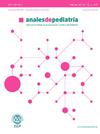Consentimiento sexual en la adolescencia. Influencia del consumo de la «nueva pornografia» en la toma de decisiones
IF 2.1
4区 医学
Q2 PEDIATRICS
引用次数: 0
Abstract
Adolescence is a transitional stage of development, with imprecise age limits, during which the individual progressively develops the maturity required for decision-making. Sexual consent is part of the right to sexual freedom, a fundamental right that must be promoted and taught from childhood. At present, there is considerable social alarm in relation to the risks associated with the increased consumption of pornography from an early age. Pornography provides a distorted image of sexual relations that does not feature the elements of consent or respect to the other, commonly offering visual content that normalizes violence, humiliation and the objectification of human beings. The lack of comprehensive sex education with an affective component, combined with the emergence of “new pornograph” as a school of sexuality, means that adolescents may come to accept and/or normalize nonconsensual sexual relations that can violate the dignity of the individual. The aim of the study was to perform a critical review of the literature available in the main databases published from 2015 to present in order to characterize the consumption of pornography by adolescents and its associated risks. Lastly, it addresses individual and social factors involved in sexual consent, as well as aspects related to the autonomy required for the individual to be able to consent.

青少年时期的性同意。“新色情”消费对决策的影响
青春期是一个发展的过渡阶段,年龄界限不明确,在此期间,个人逐渐发展到决策所需的成熟度。性同意是性自由权利的一部分,这是一项必须从小就提倡和教育的基本权利。目前,社会对从小就增加色情消费所带来的风险感到相当震惊。色情制品提供了一种扭曲的性关系形象,没有同意或尊重对方的要素,通常提供使暴力、羞辱和物化人类正常化的视觉内容。缺乏具有情感成分的全面性教育,加上“新色情”作为性学校的出现,意味着青少年可能会接受和/或正常化可能侵犯个人尊严的未经同意的性关系。该研究的目的是对2015年至今发表的主要数据库中的文献进行批判性审查,以确定青少年色情消费及其相关风险的特征。最后,它讨论了涉及性同意的个人和社会因素,以及与个人能够同意所需的自主权有关的方面。
本文章由计算机程序翻译,如有差异,请以英文原文为准。
求助全文
约1分钟内获得全文
求助全文
来源期刊

Anales de pediatria
医学-小儿科
CiteScore
2.10
自引率
4.80%
发文量
155
审稿时长
44 days
期刊介绍:
La Asociación Española de Pediatría tiene como uno de sus objetivos principales la difusión de información científica rigurosa y actualizada sobre las distintas áreas de la pediatría. Anales de Pediatría es el Órgano de Expresión Científica de la Asociación y constituye el vehículo a través del cual se comunican los asociados. Publica trabajos originales sobre investigación clínica en pediatría procedentes de España y países latinoamericanos, así como artículos de revisión elaborados por los mejores profesionales de cada especialidad, las comunicaciones del congreso anual y los libros de actas de la Asociación, y guías de actuación elaboradas por las diferentes Sociedades/Secciones Especializadas integradas en la Asociación Española de Pediatría.
 求助内容:
求助内容: 应助结果提醒方式:
应助结果提醒方式:


